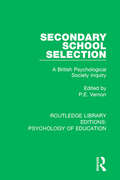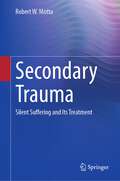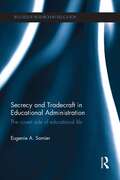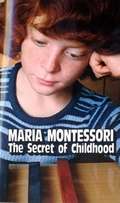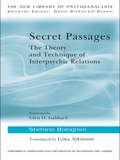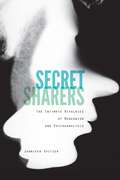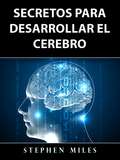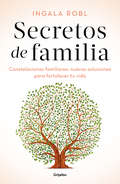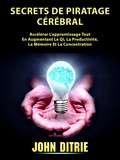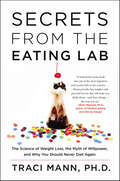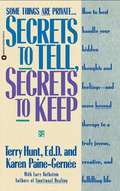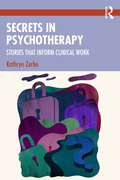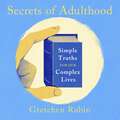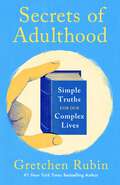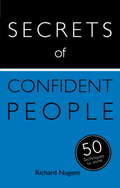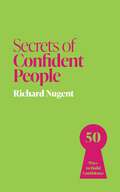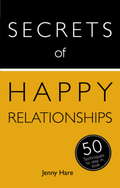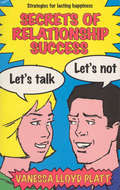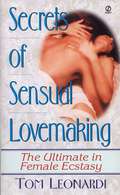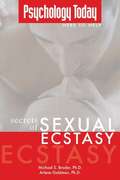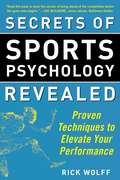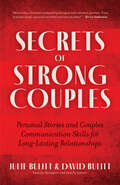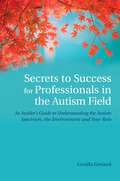- Table View
- List View
Secondary School Selection: A British Psychological Society Inquiry (Routledge Library Editions: Psychology of Education)
by P. E. VernonSelection for secondary education at 11-plus still arouses widespread controversy; and the psychological techniques which are employed, such as intelligence and attainments tests, are often criticised. Originally published in 1957, under the auspices of the British Psychological Society, a group of psychologists, experienced in this field, tried to present a balanced survey of the situation at the time. They show that the real problems of secondary schooling cannot be solved by simple administrative changes; they arise from historical causes, from the class structure of English society and the educational and vocational ambitions of parents. Psychology has studied the development and differentiation of children’s abilities and interests with age, and thus throws light on the need for, and the consequences of, streaming children in different classes or schools, and the value of alternative systems such as the comprehensive school. Selection at 11-plus, it is admitted, does have harmful effects on teaching in the junior school and produces much emotional strain, though these effects are often exaggerated. It was, in fact, accurate for some ninety per cent of children; yet the implications of its inevitable inaccuracy for some pupils cannot be ignored. The functions, and the value, of intelligence and attainments tests and the essay are examined, and full consideration given to the use of teachers’ estimates of suitability and other techniques. The Report is addressed primarily to teachers, educational administrator, and psychologists – that is people with some background knowledge of the problems involved; but it should also be intelligible and helpful to the educated layman, since the more technical details are confined to Appendices.
Secondary School Teaching and Educational Psychology (Effective Teacher, The)
by Anne Edwards David GallowayA companion volume to Primary School Teaching and Educational Psychology, this book concerns itself with the day-to-day business of teaching in a secondary school. Throughout the book four themes reoccur: that teachers can best understand the development of children by observing their learning and their relationships within school; that assessment and evaluation are integral to effective teaching; that effective teaching and learning depend on both teacher and child being able to monitor own progress and to find solutions to problems that occur; and finally that there must be explicit recognition of the common-ground between educational psychology and other disciplines such as sociology, philosophy and the history of education.
Secondary Trauma: Silent Suffering and Its Treatment
by Robert W. MottaThis book focuses on secondary trauma as distinct from other forms of psychological trauma and PTSD. While PTSD has garnered considerable attention in the literature, secondary trauma afflicts a far greater number of people. Secondary trauma refers to the spread of negative emotional and cognitive states from those who are traumatized to those who have close contact with these individuals. While PTSD and other forms of primary trauma can negatively alter one’s self-perception and result in a fearful distrust of one’s environment, secondary trauma taxes and drains one emotionally but often does not cause a weary distrust of the environment and negative self-view. The book delineates how, when, and where secondary trauma occurs and provides the latest information on treatments. it is noted that unlike primary trauma and PTSD which respond to traditional treatments such as cognitive-behavioral therapy and exposure therapy, secondary traumatization is best addressed with interventions such as targeted social support, various exercise interventions, mindfulness, yoga, animal assisted therapy, and immersion in natural environments. Secondary trauma is a common and commonly ignored stressor whose impact is wide ranging. This volume accessibly brings this problem to the fore and is a resource for all of those who deal with "silent sufferers" and paves the way for further, necessary study.
Secrecy and Tradecraft in Educational Administration: The covert side of educational life (Routledge Research in Education)
by Eugenie A. SamierDuring the last couple of decades, there has been an expansion in a number of related and overlapping fields producing evidence of covert activities: toxic cultures, destructive leadership styles, micropolitics, ethical problems in organisations and administration, abusive power and authority, and many other topics of dysfunctional management and leadership studies that frequently make reference to secretive and deceptive behaviour. In this book, Eugenie A. Samier draws on a range of disciplines including education, psychology, administration and management studies and organizational theory to provide a comprehensive examination of the ways in which organisational leaders and administrators carry out their roles in a secretive or deceptive manner. Samier presents a theory of covert administration that can be used to: provide an analysis and interpretation of secretive and deceptive activity inform decision-making both theoretically and practically offer a means of diagnosing errant management using secretive and deceptive practices provide a general set of guidelines for determining when clandestine activities may be legitimate and moral. Alongside a detailed presentation of the theory of covert administration, the book explores covert administration in practice, factors leading to it, and the results of attempts to combat its many forms. It will be key reading for researchers and postgraduates with an interest in the field, as well as administrators and policy makers.
Secret Of Childhood
by María MontessoriMaria Montessori describes the child with warmth and the exactness of a scientist. She also discusses the array of materials and techniques needed to release his learning potential.
Secret Passages: The Theory and Technique of Interpsychic Relations (The New Library of Psychoanalysis)
by Stefano BologniniSecret Passages provides a theoretical and clinical exploration of the field of psychoanalysis. It looks at the pivotal relationship between analyst and client and its importance to the psychoanalytic process. Offering a uniquely global perspective, Bolognini considers the different trends in contemporary psychoanalysis, charting a course between the innovative and traditional. Divided into three parts, areas of discussion include: plurality and complexity in the internal world the complex nature of psychoanalytic empathy from the transpsychic to the interpsychic. Drawing on vivid clinical examples throughout, Secret Passages will be of great interest to all psychoanalysts, in particular those with an interest in gaining a more global theoretical perspective.
Secret Sharers: The Intimate Rivalries of Modernism and Psychoanalysis
by Jennifer SpitzerSecret Sharers traces a genealogy of secret sharing between literary modernism and psychoanalysis, focusing on the productive entanglements and intense competitive rivalries that helped shape Anglo-American modernism as a field. As Jennifer Spitzer reveals, such rivalries played out in explicit criticism, inventive misreadings, and revisions of Freudian forms—from D. H. Lawrence’s re-descriptions of the unconscious to Vladimir Nabokov’s parodies of the psychoanalytic case study. While some modernists engaged directly with Freud and Freudian psychoanalysis with unmistakable rivalry and critique, others wrestled in more complex ways with Freud’s legacy. The key protagonists of this study—D. H. Lawrence, Virginia Woolf, W. H. Auden, and Vladimir Nabokov—are noteworthy for the way they engaged with, popularized, and revised the terms of Freudian psychoanalysis, while also struggling with it as an encroaching discourse. Modernists read psychoanalysis, misread psychoanalysis, and sometimes refused to read it altogether, while expressing anxiety about being read by psychoanalysis—subjecting themselves and their art to psychoanalytic interpretations.As analysts, such as Freud, Ernest Jones, and Alfred Kuttner, turned to literature and art to illustrate psychoanalytic theories, modernists sought to counter such reductive narratives by envisioning competing formulations of the relationship between literature and psychic life. Modernists often expressed ambivalence about the probing, symptomatic style of psychoanalytic interpretation and responded with a re-doubling of arguments for aesthetic autonomy, formal self-consciousness, and amateurism. Secret Sharers reveals how modernists transformed the hermeneutic and diagnostic priorities of psychoanalysis into novel aesthetic strategies and distinctive modes of epistemological and critical engagement. In reassessing the historical and intellectual legacies of modernism, this book suggests that modernist responses to psychoanalytic criticism anticipate more recent critical debates about the value of “symptomatic” reading and the “hermeneutics of suspicion.”
Secretos Para Desarrollar el Cerebro
by Stephen MilesSecretos Para Desarrollar el Cerebro: Acelerar el Aprendizaje Mientras se Aumenta el Coeficiente Intelectual, la Productividad, La Memoria y la Concentración ¡Los secretos que utilizan los profesionales para optimizar sus cerebros! Con décadas de estrategias probadas, este libro digital te mostrar las maneras más rápidas y efectivas de mejorar tu memoria. Aprenderás como incrementar la cognición y a aumentar el coeficiente intelectual en unas pocas horas. No solo eso, pero estarás más enfocado, lograras más, y tendrás más energía que antes. ¿Quieres saber cómo los mejores y más brillantes del mundo se desempeñan a niveles tan altos? Aun si eres de inteligencia promedio, puedes también aprender los secretos para alcanzar este tipo de desempeño. Esta guía te ensena técnicas probadas que mejoraran tu memoria. Incluye: - Un programa de entrenamiento rápido y eficiente - Aumenta la productividad - Aumenta la memoria - Aumenta la concentración - Aumenta la inteligencia en general + ¡Y MUCHO MÁS! Si quieres entrenar a tu cerebro de la mejor manera posible entonces este libro es para ti. Si quieres ser más saludable, curar tus enfermedades, o mejorar tu enfoque & tu bienestar, entonces esta guía es para ti. --> Desplázate a la parte superior de la página y haz clic en agregar al carrito de compra, para obtenlo al instante Descargo de Responsabilidad: Este autor y/o el dueño de los derechos de autor, no afirma, promete, o garantiza en relación la exactitud, exactitud o pertinencia de los contenidos de este libro, y expresamente renuncia a responsabilidad por errores u omisiones de los contenidos que comprende. Este producto es únicamente para uso de referencia. Por favor, consulte a un profesional antes de tomar acción sobre cualquiera de los contenidos encontrado dentro.
Secretos de familia
by Ingala RoblSiempre ha habido excluidos y siempre ha habido secretos en las familias. ¿Qué ocasionan estos actos y silencios? ¿Cómo se traducen en las relaciones personales? ¿Por qué a veces repetimos patrones y no entendemos de dónde vienen? ¿Cómo reordenar el sistema familiar para sanar? Las constelaciones familiares son un instrumento de diagnóstico altamente eficaz que proporciona una respuesta objetiva a este tipo de cuestionamientos. Mediante las constelaciones, lo que se consideraba "malo", como la enfermedad, la soledad, la tragedia o la muerte, cobra un nuevo significado y una fuerza potencial que restituye el sentido de la vida; asimismo, podemos desmitificar el dolor, reconocerlo como gran aliado, y respetar los errores y la historia de nuestros ancestros para hacer algo mejor. Por ello, en este libro actualizado, Ingala Robl (la especialista número uno en Constelaciones familiares en toda América Latina y discípula directa del creador de este método) nos presenta una extraordinaria herramienta para observar, reconocer, aceptar y honrar lo que nos ha tocado, soltar aquello que no nos corresponde y asumir con humildad que hay una fuerza superior, una gran alma que nos une a nuestros antepasados y nos guía para contemplar y vivir la vida, permitiendo que fluya hacia donde tiene que fluir: hacia un destino más allá de nuestra limitada comprensión individual.
Secrets De Piratage Cérébral: Accélérer l'apprentissage tout en augmentant le QI, la productivité, la mémoire et la concentration
by Stephen MilesLes secrets que les professionnels utilisent pour optimiser leur cerveau! Avec des décennies de stratégies testées, cet ebook vous montrera le moyen le plus rapide et le plus efficace de mettre à niveau votre mémoire. Vous allez apprendre comment augmenter la cognition et augmenter le QI en quelques heures seulement. Non seulement cela, mais vous serez plus concentrés, vous accomplirez plus et plus avec une énergie que vous n’avez jamais eu auparavant. Vous voulez savoir comment les meilleurs et les plus brillants du monde fonctionnent à des niveaux aussi élevés? Même si vous ayez qu'une intelligence moyenne, vous pouvez aussi apprendre les secrets pour atteindre ce type de performance. Ce guide vous enseigne des techniques éprouvées pour améliorer votre mémoire. Ce qui est inclu: Programme de formation efficace et rapide. Augmentation de la productivité. Augmenter la mémoire. Augmenter le focus. Augmenter l'intelligence globale. Et BEAUCOUP PLUS! Si vous voulez entraîner votre cerveau de la meilleure façon possible, ce livre est pour vous. Faites défiler vers le haut de la page et cliquez sur Ajouter au panier pour acheter instantanément Avertissement: Cet auteur et / ou le (s) titulaire (s) des droits ne font aucune réclamation, promesse ou garantie en ce qui concerne l'exactitude, l'exhaustivité ou l'adéquation du contenu de ce livre et décline expressément toute responsabilité quant aux erreurs et omissions dans le contenu qu'il contient. Ce produit est à usage de référence seulement. S'il vous plaît consulter un professionnel avant de prendre des mesures sur l'un des contenus trouvés dans ce livr genre du livre:PSYCHOLOGIE / Neuropsychologie Langue:Français
Secrets From the Eating Lab: The Science of Weight Loss, the Myth of Willpower, and Why You Should Never Diet Again
by Traci MannA provocative expose of the dieting industry from one of the nation’s leading researchers in self-control and the psychology of weight loss that offers proven strategies for sustainable weight loss.From her office in the University of Minnesota’s Health and Eating Lab, professor Traci Mann researches self-control and dieting. And what she has discovered is groundbreaking. Not only do diets not work; they often result in weight gain. Americans are losing the battle of the bulge because our bodies and brains are not hardwired to resist food—the very idea of it works against our biological imperative to survive.In Secrets From the Eating Lab, Mann challenges assumptions—including those that make up the very foundation of the weight loss industry—about how diets work and why they fail. The result of more than two decades of research, it offers cutting-edge science and exciting new insights into the American obesity epidemic and our relationship with eating and food.Secrets From the Eating Lab also gives readers the practical tools they need to actually lose weight and get healthy. Mann argues that the idea of willpower is a myth—we shouldn’t waste time and money trying to combat our natural tendencies. Instead, she offers 12 simple, effective strategies that take advantage of human nature instead of fighting it—from changing the size of your plates to socializing with people with healthy habits, removing “healthy” labels that send negative messages to redefining comfort food.
Secrets To Tell, Secrets To Keep
by Terry Hunt Karen Paine-Gernée Larry RothsteinThe pioneering therapists who wrote "Emotional Healing" present that book's long-awaited sequel. A challenge to today's popular "tell-all" psychotherapy programs, this important guide teaches readers how to discern which secrets to tell and which to keep for optimum emotional healing.
Secrets in Psychotherapy: Stories that Inform Clinical Work
by Kathryn ZerbeThis book brings together contemporary perspectives from psychodynamic treatment, advances in cognitive science, medicine, and neuroscience in a user-friendly format guiding practitioners from beginner to more advanced practitioner in working with secrets that emerge during psychotherapy.Despite their ubiquity in life and in clinical practice, secrets and secret-keeping receive limited attention in the training and skill set required for mental health clinicians. Drawing on personal experience and clinical expertise as well as film, memoir, and literature, Dr. Kathryn Zerbe shares how secrets come to light in both life and treatment, demonstrating the powerful hold that secrets can have on our lives. This book offers a fresh take on how we view our secrets, and how we can use them as a tool to sustain our most intimate and valued connections over the course of a lifetime. Using cutting-edge research as well as honed clinical expertise, the author suggests how one might go about managing the secrets of everyday living that we must keep as well as how we can identify which we can let go. Particular attention is paid to the mind/body relationship and somatic countertransference reactions. Each chapter suggests guidelines to promote wellness and resilience in the secret keeper, whether that be the psychotherapist or their patient.Written with compassion and in a user-friendly style, Secrets in Psychotherapy will benefit anyone who is navigating the thorny terrain of keeping a secret for themselves or someone they know. It is an essential read for psychotherapists, psychoanalysts, and practicing mental health professionals of all disciplines.
Secrets of Adulthood: Simple Truths for Our Complex Lives - the inspiring new book from the multi-million copy bestselling Queen of Self-Help
by Gretchen RubinThe #1 New York Times bestselling author of The Happiness Project and Better Than Before distills her key insights into simple truths for living with greater satisfaction, clarity and happiness.The right idea, invoked at the right time, can change your life. Drawing from her long studies of happiness, and also from the challenges she's faced herself, writer Gretchen Rubin has discovered the "Secrets of Adulthood" that can help us manage the complexities of life. To convey her conclusions, she turned to the aphorism - the ancient literary discipline that demands that a writer convey a large truth in a few words.Perhaps you're paralyzed by indecision, struggling to navigate a big change, fighting a temptation, or puzzled by the behaviour of someone you love; whatever you face, the right aphorism can help. From procrastination to the pursuit of happiness, Secrets of Adulthood is filled with witty and thought-provoking reflections such as:* "Recognize that, like sleeping with a big dog in a small bed, things that are uncomfortable can also be comforting"* "Accept yourself, expect more from yourself"* "Easy children raise good parents"* "What can be done at any time is often done at no time"For anyone undergoing a major life transition, such as graduation, career switch, marriage, or moving, or for those just encountering everyday dilemmas, these disarming aphorisms will inspire you by articulating truths that you may never have noticed but instantly recognize.
Secrets of Adulthood: Simple Truths for Our Complex Lives - the inspiring new book from the multi-million copy bestselling Queen of Self-Help
by Gretchen RubinThe #1 New York Times bestselling author of The Happiness Project and Better Than Before distills her key insights into simple truths for living with greater satisfaction, clarity and happiness.The right idea, invoked at the right time, can change your life. Drawing from her long studies of happiness, and also from the challenges she's faced herself, writer Gretchen Rubin has discovered the "Secrets of Adulthood" that can help us manage the complexities of life. To convey her conclusions, she turned to the aphorism - the ancient literary discipline that demands that a writer convey a large truth in a few words.Perhaps you're paralyzed by indecision, struggling to navigate a big change, fighting a temptation, or puzzled by the behaviour of someone you love; whatever you face, the right aphorism can help. From procrastination to the pursuit of happiness, Secrets of Adulthood is filled with witty and thought-provoking reflections such as:* "Recognize that, like sleeping with a big dog in a small bed, things that are uncomfortable can also be comforting"* "Accept yourself, expect more from yourself"* "Easy children raise good parents"* "What can be done at any time is often done at no time"For anyone undergoing a major life transition, such as graduation, career switch, marriage, or moving, or for those just encountering everyday dilemmas, these disarming aphorisms will inspire you by articulating truths that you may never have noticed but instantly recognize.
Secrets of Confident People: 50 Techniques to Shine (Secrets of Success series #1)
by Richard NugentWhat do confident people know that the rest of us don't?Do they have a secret recipe for success and visibly high self-esteem?Is there a special alchemy at work?'The Secrets of Confident People' reveals the 50 things you need to know to develop innate confidence and improved self-esteem, maintaining your poise and control whatever the circumstances. Some will surprise you, and all will inspire you. Put these 50 simple strategies together and you have a recipe for success, a proven formula that will unlock the secrets and uncover your potential.
Secrets of Confident People: 50 Ways to Build Confidence (Secrets of Success series #1)
by Richard NugentTHESE ARE THE REAL INSIGHTS YOU NEED TO BUILD SELF-CONFIDENCEWHAT WOULD A LITTLE EXTRA CONFIDENCE MEAN TO YOU? Confidence can help you do better at work, feel more comfortable in social situations, be more open to new experiences. Confidence can do amazing things for you. Secrets of Confident People shows you how to build it.Every one of the 50 secrets in this book contains 3 strategies you can put into practice right now to get better results. Some of the ideas will surprise you, all will inspire you. Put these simple strategies together and you have a recipe for success, a formula that will unlock your full potential.Instant ConfidenceIf you've ever done anything well, you already know how to do confidence. The secret is to know what it looks, sounds and feels like for you, and then replicate it in areas where confidence doesn't come so easily. Secrets of Confident People reveals the things you need to know to grow your self-confidence.Get the confidence habitMost people are brought up thinking you're either confident or not. That's not the case. Confidence isn't something you have or don't have; it's something you do or don't do. We all have it and can trigger it in an instant regardless of situation, experience or external factors. This book is packed with strategies for increasing confidence. By choosing one or two at a time and using them, your confidence will grow significantly no matter what your starting point. Apply the tools, techniques and principles and you will have all the confidence you could ever need in any situation.ABOUT THE SERIESSecrets books are designed to be easy to incorporate into your daily life. They boil down the essentials of important topics into short, quick lessons giving expert advice on a wide range of challenges that you can apply instantly. Each chapter outlines one of the 50 secrets and gives three strategies for putting the ideas into action. Whether you want to improve your efficiency, clear your desk, or be on top of your work, these books give the answers you're looking for.
Secrets of Happy Relationships: 50 Techniques to Stay in Love (Secrets of Success series #4)
by Jenny HareWhat do people in happy relationships know that the rest of us don't?Do they have a secret recipe for success?Is there a special alchemy to make it work?'The Secrets of Happy Relationships' reveals the 50 things you need to know to put your relationship on a firm footing and remain in love forever. Some will surprise, and all will inspire you. Put these 50 simple strategies together and you have a recipe for lasting happiness together, a proven formula that will unlock the secrets and uncover your potential.
Secrets of Kundalini in Panchastavi
by Gopi KrishnaPanchastavi is a unique hymn of praise to Kundalini, the Cosmic Life-Force behind Yoga and all the marvelous paranormal phenomena associated with it.
Secrets of Relationship Success
by Vanessa Lloyd PlattDivorce figures are at an all time high. In this provocative book Vanessa Lloyd Platt ponders who is to blame for this. Is it women who fail to balance work and home, turning it into a battle-ground, or men, who fail to help at home or communicate effectively? With quotes and anecdotes from both men and women Secrets of Relationship Success suggests how to reverse the bad habits which can destroy relationships, and provides tips and strategies for coping with adultery, stress, men's childishness and violence. By spotlighting these repeated behaviour patterns, Vanessa Lloyd Platt believes that relationships can be saved and set on the right path to lasting happiness.
Secrets of Sensual Lovemaking
by Tom Leonardi Arthur GrossSizzling with sensuality and expertise, this definitive guide shows you how to give the women in your life the best loving she's ever had. With surefire secrets to finding the elusive "G-Spot," and information on how to make monogamy and safe sex sexy, this one-of-a-kind book will make you wonder how you ever lived - and loved - without it! Compares to Naura Hayden's How to Satisfy a Woman Every Time and Brenda Venus's Secrets of Seduction. Also in the tradition of Graham Masterson's How to Drive Yor Woman Wild in Bed and Ellen Kreidman's Light Her Fire. Tom Leonardi is a noted sex columnist for P. O. V. magazine. With its tried and true technoques, Secrets of Sensual Lovemaking is one of the most essential and useful books of its kind on the market.
Secrets of Sexual Ecstasy
by Michael S. Broder Arlene GoldmanThis guide contains more up- to-date information from qualified sources than any other book-including such noted psychologists as Dr. Ruth Westheimer and Dr. Albert Ellis. Readers will discover how to optimize their sex life with the five ingredients of ultimate sexual satisfaction, attitudes and practices conducive to spectacular sex (and how to achieve them), strategies for overcoming obstacles to great sex, and how to train the brain to fall in love again.
Secrets of Sports Psychology Revealed: Proven Techniques to Elevate Your Performance
by Rick WolffThe world of sports psychology and in the introduction of mental skills coaches has exploded into the athletic mainstream over the last few decades. Before then, the attitude regarding such training was extremely conservative and “old school”—the prevailing philosophy was that “any athlete who needs to talk with a shrink needs to have their head examined.”Fortunately, with today’s modern athletes, the dark ages of mental training in sports have gone away and times have changed for the better. But as with any growing industry, there are lots of new and untested pathways to one’s mental performance training in practices and games. But depending on who you talk to, the advice that is given can vary widely—and sometimes, even be contradictory. The Secrets of Sports Psychology Revealed by Rick Wolff, one of the pioneers in the field of sports psychology, is based upon his many years of clinical, hands-on work with top professional and amateur athletes in a variety of sports. He provides real insight into what does—and doesn’t—work. Specifically:Do pre-game visualization techniques really work?Is it OK to be superstitious, or are those rituals counterproductive?Does taking a deep breath or two in a tight situation really help?What’s the best way to learn how to make adjustments in one’s game?These direct questions, and many others, are presented and answered in this easy to use how-to guide aimed directly at athletes and coaches. The answers are right to the point and are based upon the author’s observations and work over the years with top athletes.
Secrets of Strong Couples: Personal Stories and Couples Communication Skills for Long-Lasting Relationships
by David Bulitt Julie BulittKeep Your Marriage Strong“Written by a licensed relationship therapist and a divorce attorney, if you read this book, you won’t need the services of either! ” ―Becca Anderson, author of Let Me Count the Ways#1 New Release in Sociology of Marriage & FamilyCouples communication and relationship experts David Bulitt and Julie Bulitt share their relational knowledge in this book that may save your marriage. With stories and marriage help tested by real couples, learn how to survive and thrive after relationship and marriage fights, becoming parents, deaths, and other struggles.Get partnership and marriage help tested by real couples. The relationship experts behind the bestselling The Core Conversations for Couples put together another essential couples book for relationships. Secrets of Strong Couples shows you how real couples have made it through to the other side of real crises—together.Learn how to overcome couples communication hardships, marriage fights, and more. Walk alongside committed partners as you learn how to fix your marriage or relationship, no matter what life throws at you. Whether you’re dealing with infertility, job loss, infidelity, grief, or other relationship strife, these personal stories provide all the relationship and marriage advice you need to thrive!Inside this essential couples gift, you’ll find:Practical advice from authors experienced in couples, marriage counseling and divorce lawExamples of how to persevere through life’s most difficult trials without losing each otherReal couples communication help from partners who are not afraid to share their difficult storiesReaders of books like This Is How Your Marriage Ends by Matthew Fray, Marriage Be Hard by Kevin Fredericks & Melissa Fredericks, or Communication Miracles for Couples by Jonathan Robinson will love Secrets of Strong Couples.
Secrets to Success for Professionals in the Autism Field: An Insider's Guide to Understanding the Autism Spectrum, the Environment and Your Role
by Gunilla GerlandGunilla Gerland's extensive experience of the autism spectrum means she is expertly placed to offer a fresh perspective on working with autism as well as a wealth of effective tools and interventions to use in practice. In a highly readable style, with many inspiring examples, this book offers original explanations of the impairments associated with autism, showing how to discover the root cause of behaviours that are challenging, not just how to manage them superficially. It looks objectively and non-judgementally at the common pitfalls and difficulties that autism professionals may encounter, explaining how to deal with these and transition to more effective working relationships. An important section on ethics and reflection equips the reader with the knowledge and skills needed to grow professionally in the field. Packed with original insights and practical, hands-on tools and strategies, this is essential reading for teachers, teaching assistants, support workers, counsellors, social workers and anyone else working with individuals of any age on the autism spectrum.
